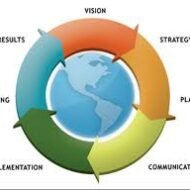Posted by Managementguru in Business Management, Organisational behaviour, Principles of Management
on Mar 6th, 2014 | 0 comments

Critical Factors Influencing Corporate Management A corporate management is said to be capable only if it is able to integrate, coordinate and direct the functional capabilities towards overall objectives and common goals of a firm, that have a bearing on an organization’s capacity and ability to implement its strategies. Multitudinous factors affect the functioning of corporate general management system. It differs with each organization with differing objectives and mode of operations. Key Factors or Contributors: The firms must evolve an effective system for corporate planning. The objectives must be realistic and achievable and clear and complete communication of plans to various levels of organization helps in execution of action plans by the respective departments. A pucca management information system is necessary that integrates all the levels through a network of computers, facilitating information processing and task implementation. If the firm is oriented towards a god deal of risk-propensity, chances of rewards are also quite high. You cannot beat your competitors unless you possess a better shade of entrepreneurship in you than others. Competency development backed up by strategy formulations, in the wake of challenges and opportunities in the external environment is well appreciated. Why everybody always talk about strategy? It is one thing that warrants for a sure success, it implies that you are smart enough to think ahead of time, what others have failed to. Don’t you want to set a path forward for the future generations to come? Values that are unique to your organization add to the image of your company. Say, if you project “quality”, as your prime value system, definitely it is going to attract consumers who are very particular about quality unmindful of the price. Slowly the idea gathers momentum and your company’s image gets a boost. But don’t forget that you have to fulfill your commitments in terms of quality without any compromise. Reward systems must be worked out to gear up the morale of top managers who are the achievers of your management objectives. Their track records and degree of commitment should be analyzed to decide on pay and promotions. A favorable organizational climate is inevitable for the organization to progress in the desired direction without any internal politics and power struggles. The role of top management is very crucial in that, it has to identify people with vested interests and bring them back into the groove by making necessary changes in the organization structure or go for weeding out actions if things go out of control. Ultimately, the overall objectives of the organization is what that matters, and people must be trained to accept the organizational changes which form a part of the developmental procedures of management. Social responsibility is much talked about these days, and the corporate firms are in a position to discharge their duties pertaining to social welfare, as part of their corporate management programme.It has become a regular feature of the management process to part with a share of their profit towards a social cause. Corporate management is a comprehensive process that covers all aspects of the management with growth as its motto and social conscience as its...

Posted by Managementguru in Entrepreneurship, Project Management
on Mar 6th, 2014 | 0 comments

How can we define Business? Business is an important institution in the society. Be it for the supply of goods and services; Creation of employment opportunities; Offering better quality of life; Contribution to the economic growth of a country; the role of business is crucial. The subject of business is as interesting as its role in society. The more one reads about it, more interesting does business become. To be successful, you have to have your heart in your business, and your business in your heart. – Thomas Watson Sr. Entrepreneurial activities The increasing number of business schools and institutions signify the importance and the need for training the students on rudiments of business management. Developing countries encourage entrepreneurial activities and view it as a strategy to improve the GDP (Gross Domestic Product). More business activity means increased per capita income and increased standard of living. A business must make profit to succeed. Profit is income minus outgo. It is the main incentive for starting a business. Business people weigh each of their decisions in terms of making profit and avoiding loss. In a corporate environment, business has to aim for wealth maximization apart from profit maximization to increase the shareholder’s wealth in the long run. The scope of business is indeed vast. It all depends on how well you have analyzed and understood the nuances of your business activity, in order to survive and sustain in the market. Supply Chain The supply chain in a business activity involves numerous links in the form of manufacturers, supplier of raw materials to the manufacturer, dealers, logistics, intermediaries, consumers, bankers, advertising agencies, insurance agencies and so on. All these elements have to function in a coordinated manner for the benefit of the consumer. Now days, business has become customer-centric rather than product-centric. This serves both the purpose of product development in lieu of customer needs and customer satisfaction. The multitudinous activities involved in bringing raw materials to the factory and the end product from there to the market constitute business. In addition, a business activity has to comply with legal restrictions and government regulations. A business is also expected to discharge its social obligations to consumers, employees, owners and to other interest groups, which have stakes in business directly or indirectly. Planning and organization Planning and organization are two key principles in running a business enterprise as planning sets up a concrete premise on which action plans can be developed and organized activities assures definite success. Modern business is dynamic. Future business will be knowledge based and brainpower will be in greater demand. Organizations have become flat. Eight to twelve organizational layers have been reduced to two or three. Gone are the days of sheltered markets, subsidies, licenses, quotas and restrictions. Businesspersons are asked to stand on their feet, to eliminate inefficiencies, cut down costs and improve productivity. LoL! It might be said that it is the ideal of the employer to have production without employees and the ideal of the employee is to have income without work. –E. F....




